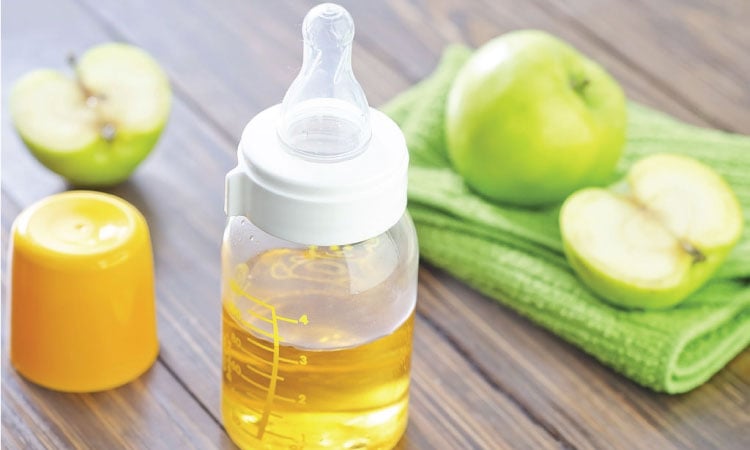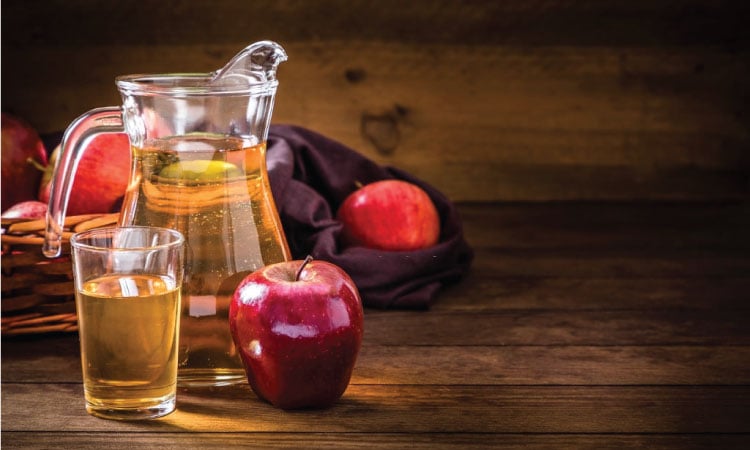Constipation in babies is quite common. The issue generally aggravates as the baby is introduced to solids. Apple juice is one of the best baby constipation home remedies. However, it is important to know when and how to use apple juice for baby constipation.
Apple has high fiber content. So, eating apples is found effective in relieving constipation. Babies, however, can’t eat apples. Juicing it is the next option. Juicing, but significantly bring down the fiber content of apple. Yet, it has many other constituents that help to combat constipation in babies.
Why Do Babies Get Constipated?
Usually, babies tend to constipate during the time of transition from breast milk to formula or from breast/ formula milk to solids. Also, incidence of constipation in breastfed babies is less when compared to formula-fed babies.
After six months, whenever new food is introduced to the baby, he may constipate. This is because the digestive system of babies is not yet fully developed and functional, and it needs some time to become accustomed to a new food.
Related Reading: How Often Should A Breastfed Baby Poop
Parents need to ensure to follow a 3-day wait rule when introducing a new food to babies- which basically helps to check for allergies and prepares the digestive system for this new food item.
Some other reasons for constipation in babies are:
- When it comes to babies from 6 months to one year, relying majorly on milk (breast milk/ formula) may increase the risk of constipation. This is because drinking too much milk will affect the baby’s intake of solids. This can, in turn, affect fiber intake, and the lack of fibre can trigger constipation
- When it comes to babies under six months old, making formula in the wrong proportion can cause constipation. Adding more powder or adding less water makes the formula stronger than it is intended to be. Stick to the directions on the pack
- Likewise, switching formula brands can also cause constipation. Babies tend to respond to changes in food quickly
- It is very important to choose the solids according to age. Introducing solids earlier or introducing complex solid faster can cause constipation in babies. Always start with simple, easily digestible solids and graduate to the complex ones as the baby gets used to the basics first
- Painful bowel movement is another cause of constipation in babies. While passing a hard stool may create a small tear or crack in the skin around the anus. After that, whenever the baby passes stool, it may generate pain. Babies tend to hold poo in order to avoid this pain. This can cause constipation.
- Some toddlers tend to ignore the urge to do the toilet because they are busy playing. When this is repeated, it can cause constipation. It is found that holding back is one of the primary reasons for constipation in all sections of people.
- Any changes in the routine of the baby can affect digestion and hence increase the risk of constipation. Traveling, changes in climate, any kind of change of circumstance (like functions, festivals, get-togethers) can affect the food intake and hence increase the risk of constipation.
- Illness and medicines are other culprits. Baby’s appetite changes when he or she is not well. The intake of food will be drastically low. Also, the drugs that are given for illness can contribute to constipation.
When Can I Use Apple Juice For Baby Constipation?
Giving apple juice is very effective in relievingconstipation in babies. Wondering at what age can apple juice be given to a constipated baby? Giving apple juice as a medicine is not the same as introducing a baby to apple juice as food.
According to a source, you can give 30 ml apple juice a day for every month until four months. This means you can give up to 30 ml apple juice to a one-month-old baby, 60 ml for a two-month-old baby, and 90 ml for a four-month-old baby.
After one year, up to 120 ml of apple juice is fine to give. When it comes to giving apple juice to combat constipation, besides the quantity of juice and age of the baby, the baby needs to be observed closely. Every baby reacts differently to a given food, and these quantities are general guidelines- you will need to change the same to suit your baby’s needs’.
Observe closely if the given quantity is more or not enough. If the baby shows signs of loose motion rather than an easy bowel movement, next time, give the baby less quantity. If the constipation issue shows no progress, you can increase the quantity little by little .
How does Apple Juice Help To Relieve Constipation?

Apple juice has a relatively high fructose – glucose ratio and a significant amount of sorbitol content. Sorbitol which is sugar alcohol, is a natural laxative. The sugars in apple juice are hard to digest. Therefore, these sugars pull fluid into the intestine. This softens the stool and promotes easy bowel movement.
Normally When Can Babies Have Apple Juice?
If your doctor does not recommend apple juice earlier to manage constipation, one year old is considered the ideal age to start giving apple for a child. Like any other new food, introduce apple juice to the baby slowly.
Can I Give Apple Sauce To A Constipated Baby?
As apple juice is excellent for relieving constipation in breastfed babies and solid-eating babies, many mothers think apple sauce is as efficient as apple juice to relieve constipation in babies. But that is not true.
In fact, apple sauce may aggravate constipation. This is because the level of pectin is high in apple sauce.
Pectin is a water-soluble fiber, and it absorbs water and becomes jelly-like. This could make the stool firmer and more difficult to pass. Therefore never give apple sauce to a constipated baby. However, it is the best choice for combating loose motions in babies.
How To Give Apple Juice To A Constipated Baby?
A small amount of pure apple juice will be enough to soften the stool. Always use 100% fresh apple juice. Packaged apple juice and fruit drinks contain added sugar which contributes to tooth decay and digestive issues. It also makes the baby feel full and stops the child from having normal foods.
Related Reading: 9 Scientifically Proven Benefits Of Baby Massage
You can give apple juice using a spoon. Giving fruit juices in a sip-up cup or bottle can pave the way for tooth decay. You can also give warm apple juice for baby constipation. For this, never boil the apple juice. Instead, use warm water while diluting.
What Precautions Should I Take When Giving Apple Juice For Constipation To My Baby?

- Refrain from giving baby too much apple juice. Apple juice is relatively high in sugar. Therefore, if the baby drinks too much apple juice, the baby feels full for quite a long time. So the baby may not consume enough breast milk, formula, or solids as he usually does. This will adversely affect the baby’s nutritional intake
- Start giving small quantities and gradually increase the quantity. This way, find the right quantity that works for your baby and stick to that quantity
- Always make apple juice at home rather than relying on apple juice available in the market. Even though if the tetra pack says it is pasteurized, it will not be as effective as fresh apple juice when it comes to combating constipation in babies.
- Pick hard, fresh, and brightly colored apples to make juice
- Never add sugar while making juice. This is the most important factor you should consider when giving apple juice for baby constipation
- Always use warm or boiled water while making apple juice for babies
Babies get constipated for many reasons, but the basic cause is that the baby’s digestive tract is still not mature enough. However, more often, constipation in babies will resolve as the baby grows. And as you see, there are many natural remedies to combat baby constipation.
FAQs
It is generally not a good idea to mix apple juice with formula. Apple juice is already safe to give your child, so it is unnecessary to mix it with formula. Furthermore, it might produce a bad taste. Once your baby tastes this and decides they don’t like it, it can be difficult to make them drink formula again.
It might also change the composition of the formula, possibly causing other digestive issues. So, instead of trading constipation for, say, diarrhea, it is best to just give the baby formula and apple juice separately. It works just the same!
Once the baby is four months old, you can safely give up to 60 ml of apple juice. However, for babies below one month of age, refrain from giving any juices without asking the doctor.
Doctors may have other options than giving juice as the digestive system of just-born babies is not mature enough to digest juices.
After six months of age, you can give around 100 ml. Babies above one year can safely have 120 ml of 100% apple juice to combat constipation. However, the exact quantity of apple juice that works for constipation varies as different babies react differently to apple juice.
It is better to start with less amount and increase the quantity until the baby able to pass smooth stools. Next time when the baby is constipated, you can use the amount of apple juice that worked for you previously.
While giving juice to the baby, always dilute it with an equal amount of water. This is relevant while using apple juice for baby constipation as well. Make sure the water you use to dilute is boiled and of room temperature.


